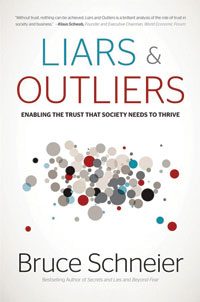Society’s Dependence on Trust and Security

|
Just today, a stranger came to my door claiming he was here to unclog a bathroom drain. I let him into my house without verifying his identity, and not only did he repair the drain, he also took off his shoes so he wouldn’t track mud on my floors. When he was done, I gave him a piece of paper that asked my bank to give him some money. He accepted it without a second glance. At no point did he attempt to take my possessions, and at no point did I attempt the same of him. In fact, neither of us worried that the other would. My wife was also home, but it never occurred to me that he was a sexual rival and I should kill him.
Thus begins Bruce Schneier’s amazing new book, Liars and Outliers.If you are not familiar with his work, Schneier is a renowned security technologist who studies the human side of security. His monthly newsletter has more than 250,000 subscribers, and he has authored two prior best-selling books.
Similarly, Bruce Springsteen, in the release of his new song “We Take Care of Our Own,” notes the disappearance of a small-town America where we looked out for each other and cared for those in need locally. We knew our neighbors, plumbers and our town officials. Springsteen suggests that this fabric of trust and community is part of an era gone by.
Schneier, the less famous Bruce, clearly points out that the changes that challenge our civilization are global and require security thought-leaders to rely on trust while dealing with the untrustworthy. These are noted as positive changes overall with these negative implications:
• The Internet enables impersonation fraud and spam while privacy is lost.
• Globalization has led to terrorism and government overreaction.
• The electronic financial system enables hacking and theft of both money and information.
• Worldwide supply chains have caused tainted foods and unsafe products.
• Global production has led to global pollution.
And while we have globalized, we have lost our local fabric that holds communities and civilizations together. For example, the officials of Bell, California, looting the city treasury while families in need suffer. This notion is unsettling to both Bruces and most civil-minded Americans.
While Springsteen mourns the loss of trust and hopes it is regained, Schneier’s entire book is about trust in a world forever changed by the bulleted paradigms noted here and security. Security, he notes, is the only type of societal pressure that can act as a physical constraint on behavior regardless of how trustworthy people are or are not.
While the world has become virtual for many business processes and transactions with anonymous counterparties, humans still rely on their learned behaviors in the physical world when transacting. The friendly plumber we see at our door and allow into our homes is far more unknown and possibly nefarious on the Internet.
This is a valuable and informative read. The author does not only give the foundation for his ideas beginning with the chapter on the Natural History of Security, but he thoughtfully addresses what needs to be done in the future to leverage technology and be able to “trust in trust.”
Looking for a reprint of this article?
From high-res PDFs to custom plaques, order your copy today!






